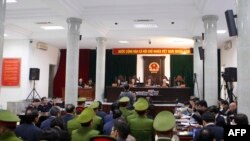A new regulation around the coverage of court proceedings could further stifle press freedoms in Vietnam, journalists say.
Under the regulation — known as the Ordinance on Sanctions of Administrative Violations for obstructing procedural activities —journalists who record video or audio of a trial without the consent of the presiding judge risk being fined up to 15 million Vietnamese dong ($640).
The regulation, approved by Vietnam’s National Assembly Standing Committee on Thursday, also makes it illegal for media to record participants in the procedural activities without their consent. The minimum fine for a violation is 7 million Vietnamese dong ($300). The amount is close to the average monthly salary in Vietnam, according to the data company Statista.
When the law goes into effect September 1, journalists will need to seek permission to make recordings of all administrative, civil and criminal courts.
Journalists found in violation of the law will be required to hand over any recordings.
Vietnam’s Deputy Chief of Justice of the Supreme Court Nguyen Tri Tue was cited in state-run media as saying the law is needed to address an increase in violations in court proceedings that make it difficult for judges at work and affects the quality of the hearings and authority of the judiciary.
In Vietnam, journalists have the right to record court hearings under the Press Law. In other countries, media are often banned from filming or photographing court proceedings.
Legal experts, journalists and even some lawmakers have criticized the regulation, saying that penalizing a journalist who records court hearings contradicts other laws and hinders the media’s right to work.
Nguyen Cong Phu, former deputy chief of the Economic Court of the People's Court of Ho Chi Minh City, was quoted in state media saying that sometimes journalists don’t publish the recordings but instead use the audio or footage as a record if someone contradicts their reporting.
Ha Huy Son, a lawyer who defends bloggers and activists in courts, told VOA no restrictions should be in place if a trial is public.
“[Journalists] need to make audio and video recordings to defend themselves in case there are lawsuits against them,” said Son. “This regulation poses a challenge for them.”
Vo Van Tao, who has 15 years’ experience working for state-owned newspapers, told VOA that he sees shortcomings in the new regulation.
“In the press law, it is stated that the rights and responsibilities of journalists, and the press in general, are to investigate and clarify issues of concern for the society,” said Tao. “If a law attributes journalists who tape-record court sessions to a crime, then I think there is something wrong with that.”
As well as working in journalism, Tao has 10 years of experience as a people’s juror at the People’s Court in central Nha Trang.
Chief Justice of the Supreme People's Court Nguyen Hoa Binh has argued that while journalists have rights, “the law is to protect people's privacy."
National Assembly member Luu Binh Nhuong is among those opposed to the regulation. He was quoted by the Vietnamese media outlet VnExpress as saying that unless trials involve state secrets, military secrets or sexual assault cases, it is unnecessary to limit audio and video recording.
As for public trials, he said he believes journalists are entitled to their rights in accordance with the Press Law.
At public hearings, media often act as an independent observer of proceedings. But if "journalists are not allowed by the jury to make audio or video recordings, there is no evidence to prove the truth to their published article," said Nhuong.
In many public trials of journalists or human rights activists, family members of the defendants are not allowed to attend, according to Tao.
At the August 16 appeal hearing for Le Van Dung, the journalist’s wife was not allowed to attend the public trial, Dung’s lawyer, Dang Dinh Manh, told VOA.
Dung’s appeal of a five-year sentence for “anti-state” charges was denied by the Hanoi Court.
Tao said the new regulation will "strangle more press rights" in the country where traditional media are closely controlled by the single party.
“Regulations that hinder journalists from practicing will expose the society to untrue information, and that will only be detrimental to the society,” said Tao.
In many cases, independent bloggers and journalists are the only source of freely reported news, according to media watchdog Reporters Without Borders.
The New York-based Committee to Protect Journalists also notes that Vietnam is the fourth-worst jailer of journalists globally, with 23 detained for their work at the time of CPJ’s 2021 prison census.
Vietnam’s Foreign Ministry, however, has repeatedly said the country does have press freedom.
This article originated in VOA’s Vietnamese Service.
New Law in Vietnam Brings Fines for Recording in Court Without Permission
- By Linh Dan




